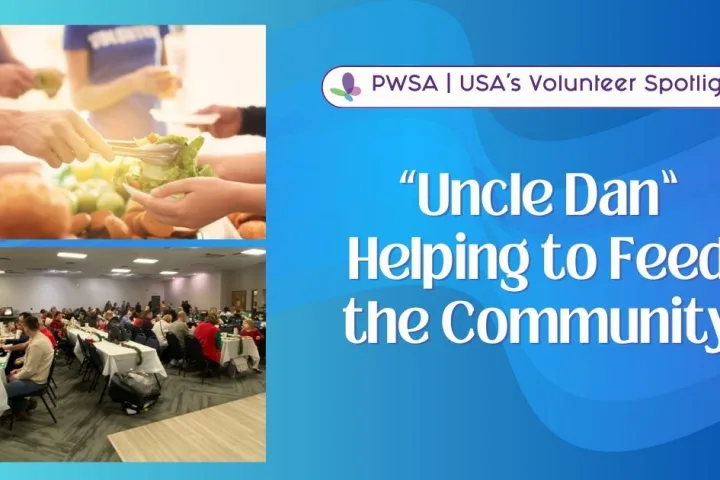Contributed by Winnie White
I was not a dog person, but as parents, you will do whatever needs to be done to help your child. As Sandy Kay has gotten older and her food anxiety has significantly increased, we began to investigate other ways to treat anxiety in addition to medication through a doctor’s care. I talked with another parent who said that a service dog had really helped her child, and she highly recommended we look into it.
My husband and I decided to research service dogs in our area. For four years, we were turned down for getting a service dog. We would apply each year to the same companies and each year we would get nowhere. But this year, something was different. We started to focus on what was reasonable and kept our application language very simple.
For example, Sandy Kay has a dual diagnosis of Prader Willi Syndrome and Nonverbal Autism. We focused our application language on what an autistic service dog could provide such as help reduce anxiety, interrupt or de-escalate meltdowns, improve social interactions and relationships, and help with safety since she has been known to elope. Once I focused on these types of skills that a service dog could bring to our family, we had doors open for us.
Two agencies took our case! We ended up choosing Bark and Bone out of Mount Olive, NC, because they were willing to work with an Aussie Labradoodle which would be hypoallergenic. The other agency, Paws 4 People out of Wilmington, NC, which was actually the Gold Standard in service dogs, only worked with Golden Retrievers and Golden Labradors. Since this dog would be a service dog for Sandy Kay and a facility dog in her special education classroom, we needed to get a hypoallergenic dog.
I am also Sandy Kay’s teacher, and I am being trained right now to be the handler for this facility dog. He will be a facility dog during school hours and when school is out, he will become Sandy Kay’s personal service dog. He is being dually trained and certified as a service dog and a facility dog.
Sandy Kay’s dog’s name is Fitz. Sandy Kay is nonverbal but is learning to communicate very well with her AAC device. We put Fitz’s name and picture in her device already. She talks about him almost every day. She has two adult sisters who both have emotional support dogs. Sandy Kay absolutely loves these dogs and wants to see them every week. I believe that when we finally get Fitz, he will do wonders for her anxiety and bring so much joy into her life.
This has been a very long journey and to be honest…expensive too. We saved for years to be able to get this service dog. They are not cheap. We also chose an older dog of 18 months. That saved us the cost of about a year’s worth of training. He belonged to a breeder who allowed us to purchase him at a reduced rate. The breeder was a psychologist who specializes in abnormal psychology and was excited for one of his dogs to become Sandy Kay’s service dog. He had read about Prader Willi Syndrome and had taught about PWS in his university classes but had never met anyone with PWS.
We were also able to receive a grant for the dog from Pawtism.org, received financial support from the Rayford Kennedy Foundation, and a fundraiser was done from a local Pizza Inn with our trainer heading that up. We were so surprised at how many people wanted to contribute to Sandy Kay’s new service dog. The outpouring of support and excitement has really reinforced in our hearts and minds that we are doing the right thing.
Fitz has been in training for about 6 months already. We are hoping that he will begin training in the classroom by the end of October and will be in our home by Thanksgiving. There are some exciting times ahead of us. Guess what, I am now a dog person! Completely in love with this new addition to our family.
Share this!





 Perry A. Zirkel has written more than 1,500 publications on various aspects of school law, with an emphasis on legal issues in special education. He writes a regular column for NAESP’s Principal magazine and NASP’s Communiqué newsletter, and he did so previously for Phi Delta Kappan and Teaching Exceptional Children.
Perry A. Zirkel has written more than 1,500 publications on various aspects of school law, with an emphasis on legal issues in special education. He writes a regular column for NAESP’s Principal magazine and NASP’s Communiqué newsletter, and he did so previously for Phi Delta Kappan and Teaching Exceptional Children. Jennifer Bolander has been serving as a Special Education Specialist for PWSA (USA) since October of 2015. She is a graduate of John Carroll University and lives in Ohio with her husband Brad and daughters Kate (17), and Sophia (13) who was born with PWS.
Jennifer Bolander has been serving as a Special Education Specialist for PWSA (USA) since October of 2015. She is a graduate of John Carroll University and lives in Ohio with her husband Brad and daughters Kate (17), and Sophia (13) who was born with PWS. Dr. Amy McTighe is the PWS Program Manager and Inpatient Teacher at the Center for Prader-Willi Syndrome at the Children’s Institute of Pittsburgh. She graduated from Duquesne University receiving her Bachelor’s and Master’s degree in Education with a focus on elementary education, special education, and language arts.
Dr. Amy McTighe is the PWS Program Manager and Inpatient Teacher at the Center for Prader-Willi Syndrome at the Children’s Institute of Pittsburgh. She graduated from Duquesne University receiving her Bachelor’s and Master’s degree in Education with a focus on elementary education, special education, and language arts. Evan has worked with the Prader-Willi Syndrome Association (USA) since 2007 primarily as a Crisis Intervention and Family Support Counselor. Evans works with parents and schools to foster strong collaborative relationships and appropriate educational environments for students with PWS.
Evan has worked with the Prader-Willi Syndrome Association (USA) since 2007 primarily as a Crisis Intervention and Family Support Counselor. Evans works with parents and schools to foster strong collaborative relationships and appropriate educational environments for students with PWS. Staci Zimmerman works for Prader-Willi Syndrome Association of Colorado as an Individualized Education Program (IEP) consultant. Staci collaborates with the PWS multi-disciplinary clinic at the Children’s Hospital in Denver supporting families and school districts around the United States with their child’s Individual Educational Plan.
Staci Zimmerman works for Prader-Willi Syndrome Association of Colorado as an Individualized Education Program (IEP) consultant. Staci collaborates with the PWS multi-disciplinary clinic at the Children’s Hospital in Denver supporting families and school districts around the United States with their child’s Individual Educational Plan. Founded in 2001, SDLC is a non-profit legal services organization dedicated to protecting and advancing the legal rights of people with disabilities throughout the South. It partners with the Southern Poverty Law Center, Protection and Advocacy (P&A) programs, Legal Services Corporations (LSC) and disability organizations on major, systemic disability rights issues involving the Individuals with Disabilities Education Act (IDEA), Americans with Disabilities Act (ADA), and the federal Medicaid Act. Recently in November 2014, Jim retired.
Founded in 2001, SDLC is a non-profit legal services organization dedicated to protecting and advancing the legal rights of people with disabilities throughout the South. It partners with the Southern Poverty Law Center, Protection and Advocacy (P&A) programs, Legal Services Corporations (LSC) and disability organizations on major, systemic disability rights issues involving the Individuals with Disabilities Education Act (IDEA), Americans with Disabilities Act (ADA), and the federal Medicaid Act. Recently in November 2014, Jim retired.